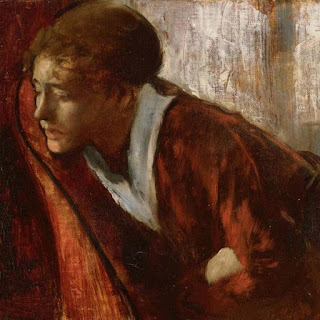 |
| Detail from 1860s Degas painting titled 'Melancholy.' Credit: Phillips Collection |
At least now, in the 21st century, we can talk about mental health issues. That wasn't done when I was younger. I was told I was sensitive and moody.
So, if the subject was taboo as recently as my youth - a half century back - what did people do about melancholy in the mid-19th and early 20th centuries? Especially on sparsely settled frontiers?
I hopped over to Project Gutenberg to see what publications of earlier eras might have to say. If you're not familiar with Project Gutenberg and you love old, public-domain books, please get acquainted! You'll be delighted.
My first perusal predated the years I discuss in this blog. Observations on Madness and Melancholy by John Haslam was published in 1809 in London. The author was an apothecary and a member of the Royal College of Surgeons.
Oddly, the text coupled madness and melancholy. Every chapter and sub-heading was about insanity. Melancholy didn't seem to be a separate topic.
I left Dr. Haslam's 350-page tome unread after searching for mentions of melancholy and finding only eight, including the one in the title. I searched for other offerings. The Anatomy of Melancholy looked promising. But it turned out to be a 19th century edition of a 1683 book. It, too, contained little about depression. Plus, I couldn't get past the fussy, overwritten prefaces and the frequent use of Latin.
Then I found a gold-mine, an abstract of a 1986 research paper originally written in German. It explained why those early books avoided discussions about depression. Turns out that use of the word melancholy as a euphemism for depression was a fairly recent development - within the last century (dating from the time the paper was written).
The academic paper featured historical notes about depression therapy. The abstract is short but fascinating. The Arabs had separate wards for mentally struggling patients as far back as the 8th century. Renaissance doctors emphasized the importance of diet for depressed patients. Eggs, meat, fish, and grapes were particularly recommended.
Opium was widely used as treatment in the 19th and into the 20th century. Doctors in the 19th century also relied on many other treatments. Some made sense to my 21st century eyes: baths and massage. Others, not at all: arsenic. You can read the abstract at the National Library of Medicine's website: https://pubmed.ncbi.nlm.nih.gov/3541174/
People in pioneer settings often lacked access to extensive medical care. I like to think they discovered the same self-help ideas I stumbled upon through the years. Exercise, at least in my case, is guaranteed to lift spirits. It's an after-effect. You have to exercise first. Staying busy is a tool in my arsenal. Sunshine helps, too. Lots of sunshine. Gratitude and prayer, too.
They're not complete answers but they're worth doing along with what doctors recommend. I'm turning my face toward the sun.

No comments:
Post a Comment